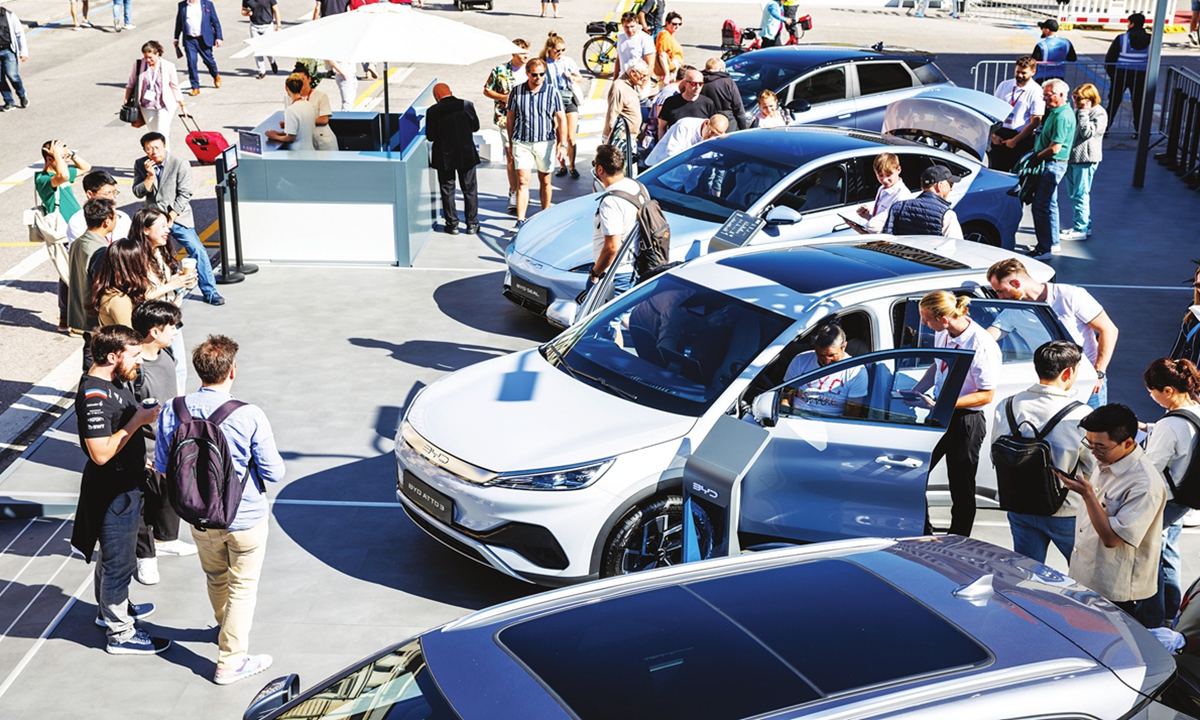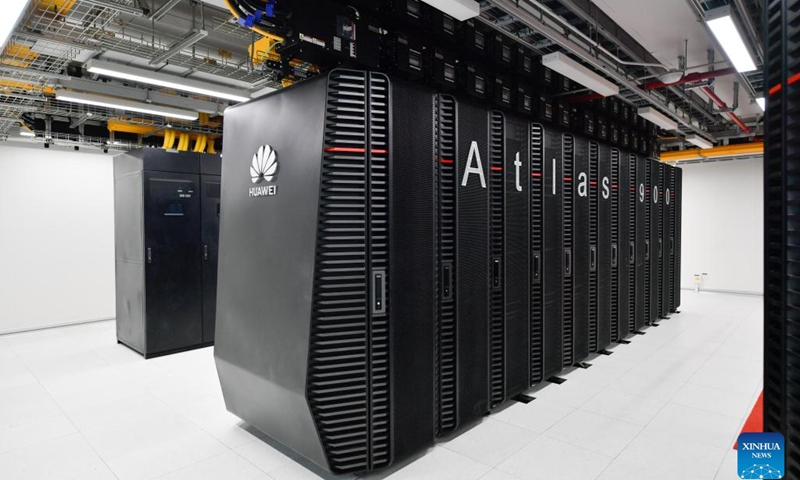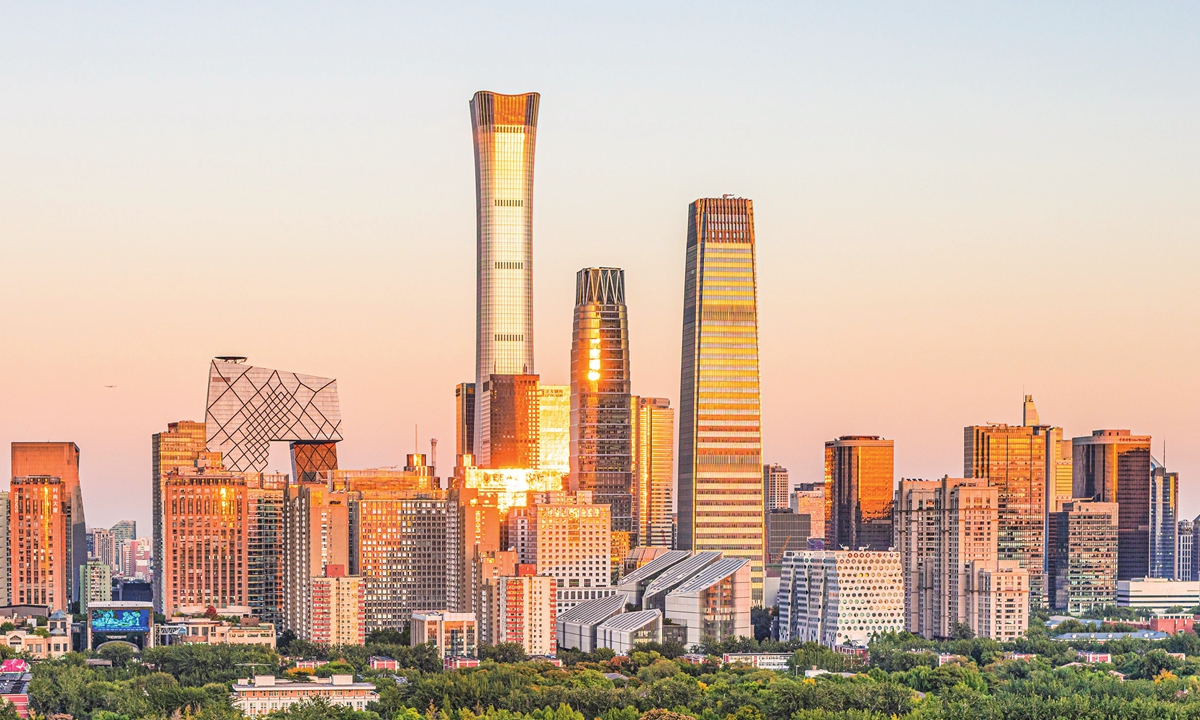
Visitors inspect vehicles at the booth of Chinese manufacturer BYD at the Open Space of the IAA 2023 auto show in Munich, Germany on September 5, 2023. Photo: VCG
Complaints have been mounting in the West, especially Western Europe, about the threat of cheap Chinese manufacturing products flooding Western markets. The main concern is electric vehicles, solar panels, and wind turbines, the key green technologies in the fight against climate change. A common accusation is that China has provided these industries with unfair state subsides which bestow on them an unfair market advantage.Such criticisms betray a failure to understand China's economic transformation combined with a failure to take China's economic strategy seriously. Both these help us to make sense of the West's reaction to China's ongoing rise. The West has always - in varying degrees - been in denial of China's rise. The roots of this are both political (the role of the Communist Party of China), and cultural (the belief that such invention and innovation are exclusive to the West and beyond the capacity of cultures like China's). As a result of this political and cultural mentality, and their intrinsic prejudices, the West has always been behind the curve of China's economic transformation.
By the time the West had begun to acknowledge, albeit reluctantly and belatedly, China's dramatic growth between 1978 and 2010, the Chinese economy was already in the process of rapidly climbing the value chain, a feat the West never believed was possible, having long assumed China was destined to be stuck in the lower reaches of the value chain. The growing realization that this was no longer the case proved one of the major reasons for the political shift in the US against China, beginning around 2010. Even then, alas, the West did not fully understand what was happening, choosing to explain it in terms of copying and cheating. A recent manifestation of this was America's refusal in autumn 2023 to believe that Huawei's new 7nm chip was a Chinese breakthrough rather than a steal from the US or somewhere else.
A critical moment was the publication in 2015 of the "Made in China 2025" programme, which set out 10 key industrial sectors in which China needed to establish itself as a major global player in its own right, including green energy and green vehicles. The West did not take China's plans seriously. The idea that China's EVs would begin to make major inroads into global markets in 2023-2024, and decimate foreign competition in China's home market, would have been dismissed as fanciful thinking, until it became an undeniable reality. The more the West seeks to explain such developments in terms of copying and cheating, the more the West will fail to understand the nature and dynamics of China's economic rise, and thereby hugely underestimate the latter's likely future industrial potential.
Let me offer another thought in this context. China, by its own admission, is miles behind the US and Europe in the field of commercial aircraft. The C919 only went into service last year. Meanwhile, however, Boeing's main competitor, the 737 Max, has become embroiled in a huge crisis over its safety after two fatal crashes and a series of minor accidents have led to serious doubts about its future. This might well hasten the C919's rise as a significant rival to the 737 Max. Who would have thought that might be possible, rather than a distant dream?
The West has consistently underestimated the ability of the Chinese economic model to deliver highly competitive products; instead always majoring on China's weaknesses, never acknowledging its strengths; and always believing its own propaganda and ignoring what was actually happening on the ground. The truth is that over the last quarter-century, and longer indeed, the Chinese economic model has - and continues - to outperform the Western model.
Climate change is a classic example. Ever since the Paris Agreement in 2015, the critical importance of limiting global warming has been internationally recognised. It is not an accident that China is by far and away the largest global producer of electric vehicles, solar panels, and wind turbines. For the West to criticize China for its global lead in these three areas, all of which are fundamental to the fight against global warming, betrays a narrow sectarian view, which prioritizes Western national interests over the global public interest. The truth is that the entire world - including the West - is likely to be highly dependent on Chinese EV's, solar panels, and wind turbines in the fight against global warming. Rather than acting in a small-minded and narrowly self-interested way, the West should be grateful and magnanimous toward China for doing what they have singularly failed to do.
How has China succeeded in a way the West has failed? As we all know, or should do, China thinks long-term while the West, in contrast, thinks little beyond the present. Such a long-term approach is a prerequisite for the development of new industries. Furthermore, China has a comprehensive bandwidth in manufacturing capacity, with, unlike any other economy, a presence in virtually every major industrial sector. This was clearly demonstrated during the pandemic when, particularly in 2021, China was able to supply much of the world with its needs.
With the new focus on the development of "new quality productive forces," we can expect China's industrial reach to extend into quite new areas in the future.
The author is a visiting professor at the Institute of Modern International Relations at Tsinghua University and a senior fellow at the China Institute, Fudan University. Follow him on X @martjacques. opinion@globaltimes.com.cn



